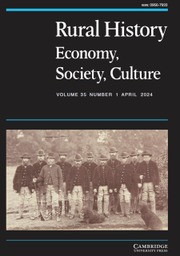Article contents
Paternalistic Consumer Co-operatives in Rural England, 1870–1930
Published online by Cambridge University Press: 17 September 2012
Abstract
The British co-operative movement is associated mainly with industrial areas. Where consumer co-operatives existed in the countryside they were located in market towns and formed by rural trade unions, especially railwaymen, occasionally quarrymen or farmworkers. Yet the Co-operative Union membership encompassed a significant number of small single village societies founded by paternalistic gentry.
This paper draws on examples in Shropshire, East Yorkshire, Berkshire and Oxfordshire, to offer an account and explanation of the never before studied, paternalistic co-operatives. Recruiting estate workers and farm labourers, individual country squires showed themselves capable of using a co-operative ideology and framework, usually associated with the labour movement, to achieve very different and paternalistic goals. The relationship between these paternalistic village societies and the wider co-operative movement, both locally and nationally, is discussed, including the company paternalism of the Co-operative Wholesale Society's own farming operations. A comparison with the ‘Blue co-ops’ of the Lancashire Conservative dominated cotton spinners’ union is also made. The paper concludes that the failure of paternalistic co-operatives was part of the post Great War revival of rural cultural conservatism, linked to the effects of agricultural depression.
- Type
- Research Article
- Information
- Copyright
- Copyright © Cambridge University Press 2012
References
Notes
1. For the context and a discussion of what little literature exists on this topic see Mansfield, Nicholas, English Farmworkers and Local Patriotism (Aldershot, 2001)Google Scholar, Chapter 5. Co-operative Union Annual Reports have also been used, but need some knowledge of the locality of the named society, and give no indication as to whether a society in a rural area was supported by patronage. Accounts in the co-operative press of paternalistic rural societies are very rare.
2. Holyoake, George Jacob, History of Co-operation (London, 1875), pp. 312–15Google Scholar; Watkins, W. P., Co-operation, Co-operative Union (Manchester, 1937), pp. 41–4Google Scholar.
3. Holyoake, History, pp. 316–17; Harrison, J. F. C., Robert Owen and the Owenities in Britain and America (London, 1971), pp. 151, 163, 164, and 172Google Scholar. For a forthcoming discussion of the context and material culture of the Owenite movement see Nick Mansfield, Red Bricks: Labour Movement Buildings in England (Swindon, in press).
4. Nick Mansfield, ‘James Hill and the Wisbech Owenites’, Wisbech Society Annual Journal, 1985; Chase, Malcolm, Chartism: A New History (Manchester, 2007), pp. 247–70Google Scholar. For the context, see also Chase, Malcolm, People's Farm: English Radical Agrarianism, 1775–1840 (Oxford, 1988)Google Scholar.
5. Mansfield, English Farmworkers, pp. 51- 53; Co-operative News, II: 49 (1872), 577–8.
6. Mansfield, English Farmworkers, p. 147; Neave, David, Mutual Aid in the Victorian Countryside, 1830–1914 (Hull, 1991), pp.10, 49Google Scholar; Co-operative Congress Reports.
7. Mansfield, English Farmworkers, 146–7.
8. Mansfield, English Farmworkers, 122–123 and 30–32.
9. Mansfield, Nicholas, Agricultural Trades Unionism in Shropshire, 1900–1939 (unpublished doctoral thesis, University of Wolverhampton, 1997), pp. 124–6Google Scholar.
10. Mansfield, Agricultural Trades Unionism, p. 126.
11. McKie, David, McKie's Gazetter – A Local History of Britain (London, 2008), pp. 48–51Google Scholar; Marsh, Jan, Back to the Land (London, 1982)Google Scholar; Co-operative Congress Reports, 1879, 1904; Fowler, Alan, The Barefoot Aristocrats: The History of the Amalgamated Association of Operative Cotton Spinners (Littleborough, 1987)Google Scholar. I am grateful for the advice of Gillian Lonergan and Ian Andrews on the ‘blue co-ops’. There was also a London Conservative Co-operative Society.
12. Malcolm Bee, ‘Co-operation in Oxfordshire, 1860–1913’, Southern History, 20/21 (1998/9), 6, 10, 21, 41.
13. Malcolm Bee, ‘Co-operation in Berkshire, 1860–1913’, Southern History, 22 (2000), 4, 6, 7, 11, 12, 14, 15 and 17.
14. Gillian Lonergan, National Co-operative Archives, pers. com. 15th May 2010.
15. Griffiths, Clare V. J., Labour and the Countryside: The Politics of Rural Britain, 1918–1939 (Oxford, 2007), p. 293Google Scholar; Mansfield, English Farmworkers, pp. 180–1; see also advertisements taken out by the Co-operative Wholesale Society in farm workers’ union journals, e.g. The Labourer, February 1915.
16. For the conservative nature of post-war rural reconstruction see Mansfield, English Farmworkers, Chapter 6.
- 3
- Cited by




